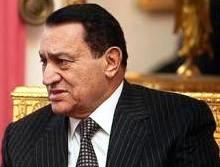 Egyptian President Hosni Mubarak compared Iran’s growing influence in the Middle East to a “cancer,” according to a cable released by the anti-secrecy website WikiLeaks.
Egyptian President Hosni Mubarak compared Iran’s growing influence in the Middle East to a “cancer,” according to a cable released by the anti-secrecy website WikiLeaks.
“President Mubarak has made it clear that he sees Iran as Egypt’s — and the region’s — primary strategic threat,” says the secret cable, sent April 28, 2009, from the U.S. Embassy in Cairo. “His already dangerous neighborhood, he has stressed, has only become more so since the fall of Saddam, who, as nasty as he was, nevertheless stood as a wall against Iran, according to Mubarak. He now sees Tehran’s hand moving with ease throughout the region, ‘from the Gulf to Morocco,’ as he told a recent congressional delegation.”
The cable notes, however, that “Mubarak’s focus on the Iranian threat differs somewhat from ours.”
“While he will readily admit that the Iranian nuclear program is a strategic and existential threat to Egypt and the region, he sees that threat as relatively ‘long term.’ What has seized his immediate attention are Iran’s non-nuclear destabilizing actions such as support for HAMAS, media attacks, weapons and illicit funds smuggling, all of which add up in his mind to ‘Iranian influence spreading like a cancer from the GCC [Gulf Cooperation Council countries] to Morocco.’”
The cable was sent days after Egyptian security services rolled up a cell of operatives from Hezbollah, Iran’s Lebanese-based proxy, based in the Sinai.
After the arrests, according to the memo, “Egypt had sent a clear message to Iran that if they interfere in Egypt, Egypt will interfere in Iran, adding that EGIS had already begun recruiting agents in Iraq and Syria.”
Knowledge of this threat was attributed to Egyptian intelligence chief Omar Suleiman.
At the time, the Obama administration’s policy of engagement with the Iranians was getting under way, which frightened the Egyptians, according to the cable.
“[T]hey are worried that we are going to strike a ‘grand deal’ with the Iranians,” it says. “The prevailing GOE view remains a principled rejection of any diplomatic rapprochement.”
Egyptian Foreign Minister Ahmed Aboul Gheit, the cable says, “has speculated that the new U.S. Administration will engage with Iran, but will be disappointed in late 2009 or early 2010 when it realizes that Iran will not stop its enrichment activities.” WP

Leave a Reply
You must be logged in to post a comment.